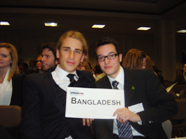Report GA 3rd
Represented by Tobias Kraski and Felix Meyer-Christian
The sessions of the Social, Humanitarian and Cultural Affairs Committee of the General Assembly (GA Third Committee) were announced to take place at the “Terrace” of the Boston Park Plaza Hotel. What sounded like the best location in the building, possibly with a view over Boston, turned out to be a room in the basement equipped with plastic folding chairs. With 350 delegates and without air-condition, the air in the “Terrace” felt hot and humid, at about 25° C. As proper representatives from Bangladesh we felt comfortable in this ‘climate’ and saw a clear advantage against the delegates from Iceland (who never showed up, as we discovered later on).
There were two topics on the agenda to be voted on: Topic A: Global Response to Natural Disaster and Topic B: Racism, Xenophobia and International Migration. We started the session with a moderated caucus in order to discuss the agenda. At this early stage, we noticed that some bloc positions and alliances had already been established. It did not take us long to decide that we would debate Topic A first, very much to our delight, since natural disasters are one of the biggest challenges to Bangladesh. Its geographic location accounts for floods, cyclones and droughts in regular periods. We were therefore quite satisfied that we had been able to emphasize the relevance of this topic. We looked forward to sharing our expertise, as Bangladesh works on programmes for flood forecasting, shelter construction and awareness raising as well as improving the exchange of information between disaster reduction institutions and the scientific community.
 |
As soon as the agenda was set, all states began strategic negotiations in unmoderated caucus in order to get to know the other countries’ positions and interests. We then tried to assemble our South Asian partners. As a result, Bangladesh and China were supposed to act as negotiators for the Least Developed Countries’ interests. By the next morning, working papers piled up and the bloc positions had gained profile. China had decided not to further cooperate with South Asia and opted for a leading role with developing states worldwide instead. |
Bangladesh and its remaining partners, among them surprisingly the People’s Republic of North Korea, drafted a working paper designed for South and Southeast Asian countries, but open to amendments by other (preferably developing) nations. These turned out to be mostly African states, but some European nations were willing to join us as well. Bangladesh, according to our National Priorities and strategies that we had worked out before, also emphasized cooperation with fellow Muslim states.
The third day was dominated by discussing draft resolutions and negotiating with allies. Together with our partners, Bangladesh introduced a draft resolution, which – unfortunately – only was distributed in the beginning of the session in the next morning.
With only a small amount of time left, the Chair suggested to start voting procedure and promoted the draft resolution that seemed most likely to gain a majority of supporters. As we thought that the Chair should remain impartial, we called for a Point of Order, which, however, was ruled out of order by the Chair. Nevertheless, the obvious display of appreciation from many other States for this move showed that we were not the only ones thinking that the chair had transgressed its competences.
Despite – or maybe because of – our enthusiasm, we were slightly disappointed about the preparative work of some other delegations. For example, we had expected the Hyogo Protocol, newest part in the International Strategy for Disaster Reduction, to play a vital role in negotiations and to serve as a starting point for discussion, but unfortunately many delegates had never heard of it. Moreover, some delegations seemed “out of character” and did not behave as “true” representatives of “their” country. However, all in all, we, the representatives of Bangladesh, left the Committee with new experiences and a little more expertise in persuasion and strategic negotiation.
Felix Meyer-Christian
Letter from the Delegation of Bangladesh to fellow Delegations in the Social, Cultural and Humanitarian Committee (GA 3rd)

Honorable Fellow Delegates,
We are the delegates for The People’s Republic of Bangladesh in this committee, and we would like to take a few minutes of your time to call your attention to an important issue.
As being a Least Developed Country (LDC), Bangladesh perceives that the topics that are dealt with in this committee are of utmost importance for the development of these countries. International Migration can play a indispensable role in the economies of LDCs by reducing unemployment and providing remittance flows as a source of foreign exchange.
The most crucial topic for Bangladesh, however, is to find a solution on how to globally respond on natural disasters. Being threatened by natural disasters almost every year with catastrophic outcomes to humans and our national economy, it is Bangladesh’s main interest to find effective measures against. Risk reduction, adaptation and prevention of climate change and wise environmental management must top agenda topics for the Committee. Natural disasters pose a bigger challenge to the international community every year, bringing high instability and insecurity.
Believing that your country may have the same opinion as Bangladesh in certain points, we would be pleased if we could manage to work together, in order to get a louder voice in the arena of the international community. We can make a difference!
Sincerely,
Felix Meyer-Christian, Tobias Kraski
Delegation of The People’s Republic of Bangladesh
